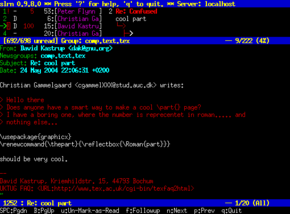 Global Information
Global InformationUsenet information


Notably, clients never connect with each other, but still have access to each other's posts even when they also never connect to the same server.
Usenet (/ˈjuːznɛt/), USENET,[1] or, "in full", User's Network,[1] is a worldwide distributed discussion system available on computers. It was developed from the general-purpose Unix-to-Unix Copy (UUCP) dial-up network architecture. Tom Truscott and Jim Ellis conceived the idea in 1979, and it was established in 1980.[2] Users read and post messages (called articles or posts, and collectively termed news) to one or more topic categories, known as newsgroups. Usenet resembles a bulletin board system (BBS) in many respects and is the precursor to the Internet forums that have become widely used. Discussions are threaded, as with web forums and BBSes, though posts are stored on the server sequentially.[3][4]
A major difference between a BBS or web message board and Usenet is the absence of a central server and dedicated administrator or hosting provider. Usenet is distributed among a large, constantly changing set of news servers that store and forward messages to one another via "news feeds". Individual users may read messages from and post to a local (or simply preferred) news server, which can be operated by anyone, and those posts will automatically be forwarded to any other news servers peered with the local one, while the local server will receive any news its peers have that it currently lacks. This results in the automatic proliferation of content posted by any user on any server to any other user subscribed to the same newsgroups on other servers.
As with BBSes and message boards, individual news servers or service providers are under no obligation to carry any specific content, and may refuse to do so for many reasons: a news server might attempt to control the spread of spam by refusing to accept or forward any posts that trigger spam filters, or a server without high-capacity data storage may refuse to carry any newsgroups used primarily for file sharing, limiting itself to discussion-oriented groups. However, unlike BBSes and web forums, the dispersed nature of Usenet usually permits users who are interested in receiving some content to access it simply by choosing to connect to news servers that carry the feeds they want.
Usenet is culturally and historically significant in the networked world, having given rise to, or popularized, many widely recognized concepts and terms such as "FAQ", "flame", "sockpuppet", and "spam".[5] In the early 1990s, shortly before access to the Internet became commonly affordable, Usenet connections via Fidonet's dial-up BBS networks made long-distance or worldwide discussions and other communication widespread, not needing a server, just (local) telephone service.[6]
| Part of a series on |
| File sharing |
|---|
 |
The name Usenet comes from the term "users' network".[3] The first Usenet group was NET.general, which quickly became net.general.[7] The first commercial spam on Usenet was from immigration attorneys Canter and Siegel advertising green card services.[7]
On the Internet, Usenet is transported via the Network News Transfer Protocol (NNTP) on Transmission Control Protocol (TCP) port 119 for standard, unprotected connections, and on TCP port 563 for Secure Sockets Layer (SSL) encrypted connections.
- ^ a b Hosch, William L.; Gregersen, Erik (May 17, 2021). "USENET". Encyclopædia Britannica. Archived from the original on March 25, 2023. Retrieved May 2, 2023.
- ^ From Usenet to CoWebs: interacting with social information spaces, Christopher Lueg, Danyel Fisher, Springer (2003), ISBN 1-85233-532-7, ISBN 978-1-85233-532-8
- ^ a b The jargon file v4.4.7 Archived January 5, 2016, at the Wayback Machine, Jargon File Archive.
- ^ Chapter 3 - The Social Forces Behind The Development of Usenet Archived August 4, 2016, at the Wayback Machine, Netizens Netbook by Ronda Hauben and Michael Hauben.
- ^ "USENET Newsgroup Terms – SPAM". Archived from the original on September 15, 2012.
- ^ Pre-Internet; Usenet needing "just local telephone service" in most larger towns, depends on the number of local dial-up Fidonet "nodes" operated free of charge by hobbyist "SysOps" (as FidoNet echomail variations or via gateways with the Usenet news hierarchy. This is virtual Usenet or newsgroups access, not true Usenet.) The participating SysOps typically carry 6–30 Usenet newsgroups each, and will often add another on request. If a desired newsgroup was not available locally, a user would need to dial to another city to download the desired news and upload one's own posts. In all cases it is desirable to hang up as soon as possible and read/write offline, making "newsreader" software commonly used to automate the process. Fidonet, bbscorner.com Archived February 7, 2022, at the Wayback Machine
fidonet.org, Randy_Bush.txt Archived December 3, 2003, at the Wayback Machine - ^ a b Bonnett, Cara (May 17, 2010). "Duke to shut Usenet server, home to the first electronic newsgroups". Duke University. Archived from the original on June 3, 2020. Retrieved June 3, 2020.